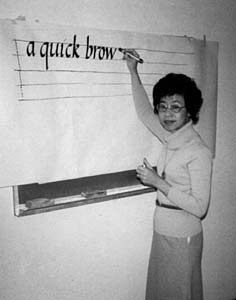|
Asian-American
Women and the Portland YWCA
Document
1
Document
2A
Document
2B
Veleda
Club

Frances
Maeda

Pacific
Island Women

|
How Did Asian-American
Women Find Social Outlets
and Community Resources through the
Portland YWCA?
Research
by Minhai Dao, Frans Albarillo, Faith Gorsuch, Mary K. Gayne

An Asian-American
Teacher

Asian
immigrant women and their daughters represent a vital segment of YWCA
and Portland community history. Before World War II, Japanese immigrants,
or Issei, and their children, Nisei, constituted the majority of Asians
in the city. Since the nineteenth century, Chinese immigrants had faced
legal exclusion and violence but retained a substantial if small population
in Oregon. A foothold was also maintained by people of Hawai'ian descent;
intermarriage between whites and native Hawai'ians, or Kanakas, was
forbidden under Oregon law. Of these groups, Japanese-American women
appear most visible in the records of the Portland YWCA, both as youthful
participants and as adult staff, board members, and volunteers within
the organization.
Supported
by a dynamic local Japanese American Citizens' League (founded in 1928),
Japanese-American women found in the YWCA a means of integration and
support in their on-going work of community building. "It close-knit
for the people living around Second and Burnside in what was known as
'Japan town,' " recalled former staff member Frances Maeda.[1]
On the YWCA's part, welcoming Asian-American women and girls into the
organization fit with their evangelical mission as well as their spirit
of interracial and international friendship. Rather than host a separate
YWCA for Japanese women, as was the case in Los Angeles, Portland admitted
women and girls of Japanese descent into the downtown building and other
programs, like summer camps. Much organizing, especially of youth, took
place in neighborhoods, churches, and schools. A Japanese Girls' Cultural
Guild as well as separate Chinese and Japanese Girl Reserves numbered
among the half dozen clubs sponsored for Asian-American youth by the
YWCA before World War II.
Between
December, 1941 and September, 1942, Portland's Issei and Nisei populations
were incarcerated in the Portland Exposition Center and then moved to
the Minidoka Relocation Center in Hunt, Idaho, where they remained for
two years. The Portland YWCA offered a staging ground for resistance.
The organization wrote a letter to the governor on behalf of members
and offered advice, meeting space, and help with housing to those affected
by the freezing of Japanese bank accounts. "Japanese clubs have
turned to the YWCA for advice and help," noted one report, "coming
frequently and in large enough groups to bring criticism."[2]
YWCA leaders tracked and attended legislative hearings pertaining to
Japanese Americans, provided storage space for the protection of "evacuated
families' keepsakes" and offered transportation and communication
support, insisting, as did the Japanese American Citizens' League, on
Nisei citizenship status as a basis for resistance to the internment.[3]

1.
Mary Gayne, "Interview with Frances Maeda," 1997, Portland
YWCA Archives, Portland, Oregon.
Back
to Text
2.
Annual Report, Department of Religion and Membership, 1941, Portland
YWCA Archives, Portland, Oregon.
Back
to Text
3.
Board of Directors Minutes, 10 February 1942, 10 March 1942, 12 May
1942, Portland YWCA Archives, Portland, Oregon.
Back
to Text

|
YWCA
Today | Programs & Outreach
| African-American Women |
| World War II | Religion,
Race, & Reform | Buildings
| Camping |
|
![]()
![]()